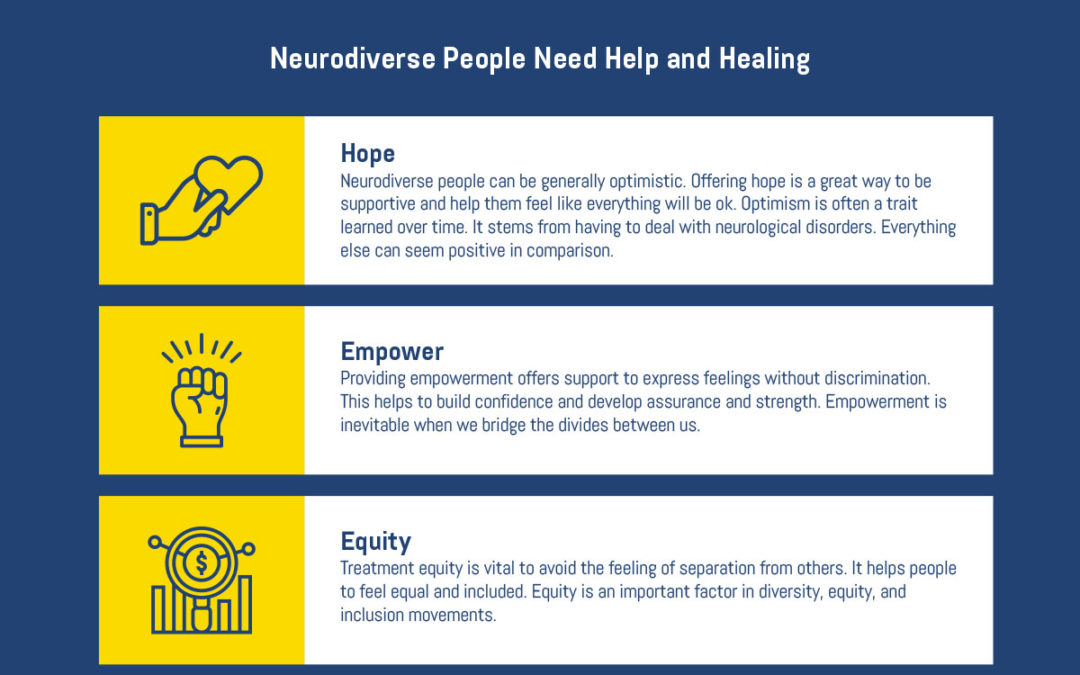
B.R.I.D.G.E. – Emerge ND Confidently
Trauma is the emotional response to a distressing event. This can include the death of a loved one, an accident, or a natural disaster. Neurodiversity-related trauma comes in many forms. It may be heightened or suppressed due to a person’s specific type of neurodiversity.
Neurodiversity-related trauma is difficult, but healing it shouldn’t be. Unrecognized and unsupported differences in neurodivergent individuals result in being misunderstood and mistreated. The B.R.I.D.G.E. approach can establish the necessary connections and overcome discrimination.
Neurodiverse People Crave Acceptance and Belonging
Difference & Fear
Neurodiverse people have a different way of thinking and approaching everyday life. It’s common for neurodiverse people to feel afraid of what others may think. Any type of difference or diversity can threaten someone’s sense of belonging.
Shame & Insecurity
Trauma can cause a feeling of shame that can develop over time. It cultivates a distress and shame cycle that can stop people from being able to live stable and healthy lives. This leads to severe insecurities about themselves and their surroundings—it affects everything they do in everyday life.
Trust
Patients recovering from trauma find it difficult to trust. It takes time to rebuild their ability to trust other people again. Trauma caused by someone’s actions creates a long-lasting mistrust of people in general.
Safety
Uncertainty of safety can trigger a discharge of pent-up “fight-or-flight” energy. This creates a feeling of being on edge and the inability to relax. If the trauma was direct to the patient, such as an injury or abuse, it will take a long time for them to feel safe again.
Neurodiverse People Need Help and Healing
Hope
Neurodiverse people can be generally optimistic. Offering hope is a great way to be supportive and help them feel like everything will be ok. Optimism is often a trait learned over time. It stems from having to deal with neurological disorders. Everything else can seem positive in comparison.
Empower
Providing empowerment offers support to express feelings without discrimination. This helps to build confidence and develop assurance and strength. Empowerment is inevitable when we bridge the divides between us.
Equity
Treatment equity is vital to avoid the feeling of separation from others. It helps people to feel equal and included. Equity is an important factor in diversity, equity, and inclusion movements.
Efficacy
Among trauma survivors, self-efficacy relates to better mental and physical health. Self-efficacy refers to an individual’s belief in himself or herself. This refers to a person’s ability to execute specific performance attainments.
Equip
It’s important to equip the collective with a structured system. It should ensure connection, inclusion, and the celebration of neurodiversity. Using this system will drive the normalizing of neurodiversity and decrease discrimination.
The BRIDGE Method Helps With Neurodiverse-Related Trauma
The B.R.I.D.G.E. approach is a way of being. It’s a system that removes obstacles and builds connections for the neurodiverse. It’s a communication pathway designed to eradicate discrimination and create connections. This provides a system promoting efficacy, equity, and empowerment everywhere in everything.
- Building for bounty – Bridging the gap between ND discrimination and alternative thinking
- Relate with recognition – Seeking belonging and acceptance through recognition, association, and connection
- Integrate for impact – Embracing Neurodiversity and valuing the individual in an integrated way, creating a powerful impact and opportunity to develop innovation
- Develop through demonstration – Demonstrating the B.R.I.D.G.E approach will develop synergy that was never before possible
- Gather for gain – Gathering ideas, information, wisdom, and fellowship designed for gain
- Empower for efficacy – Empowerment involves confidence and fortitude which develops assurance and strength through increased efficacy
Sources
https://www.webmd.com/add-adhd/features/what-is-neurodiversity
https://www.apa.org/topics/trauma#:~:text=Trauma%20is%20an%20emotional%20response,symptoms%20like%20headaches%20or%20nausea
https://www.kelly-mahler.com/resources/blog/unsafe-unheard-misunderstood-trauma-neurodiversity/
https://www.helpguide.org/articles/ptsd-trauma/coping-with-emotional-and-psychological-trauma.htm
https://www.apa.org/pi/aids/resources/education/self-efficacy
https://questpsychologyservices.co.uk/shame-why-does-it-come-from-trauma/
https://www.differentbrains.org/b-r-i-d-g-e-stigma-free-connections-for-the-neurodivergent/
https://myplaceofmind.com/Neurodiversity
Embed This Image On Your Site (copy code below):

